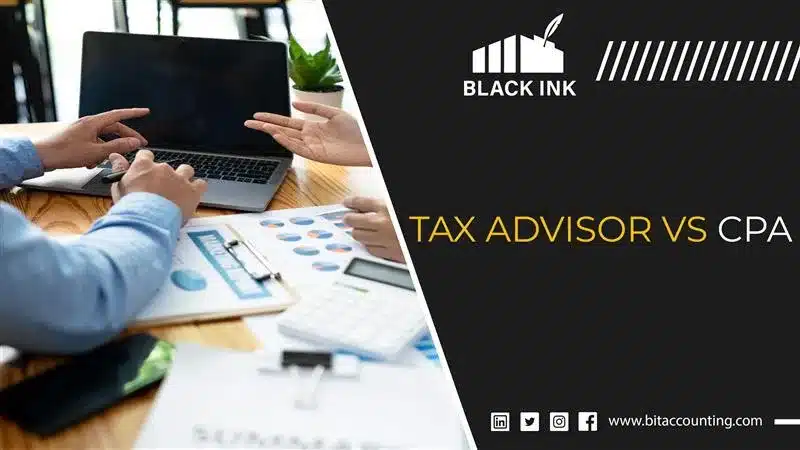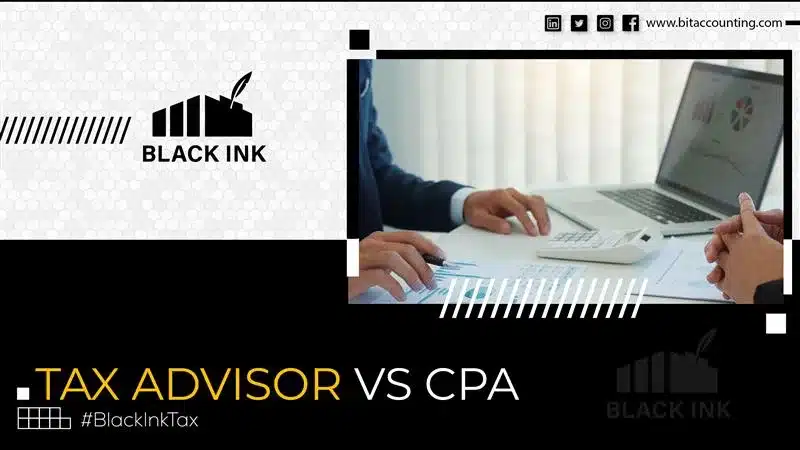
Table of Contents
Tax Advisor vs CPA: Breaking Down the Key Differences
When tax season rolls around or your business books get messy, one big question pops up: Who should I call— a tax advisor or a CPA? Both are financial pros, but their roles, skills, and services are quite different.
In this guide, we’ll break down what sets them apart, who needs which expert, and how you can make the right choice for your money, business, or career.
Whether you’re a small business owner, a freelancer, or someone dealing with complicated tax returns, this article is for you. By the end, you’ll understand the key roles of a tax advisor vs CPA, and when it’s smart to work with one—or even both.
What Is a Tax Advisor?
A tax advisor is a financial expert who helps individuals and businesses handle tax-related matters. Their job is to keep you legally compliant while helping you save money through smart tax planning.
Types of Tax Advisors
- Enrolled Agents (EAs): Licensed by the Internal Revenue Service (IRS) after passing the Special Enrollment Examination. They can represent clients in front of the IRS.
- Tax Attorneys: Lawyers who specialize in tax law, often helping with audits, disputes, and legal matters.
- Tax Consultants: Professionals who offer advice on tax strategies, deductions, and credits.
Services They Offer
- Tax planning and strategy
- Filing income tax returns (including Form 1040)
- IRS audit help
- Identifying tax deductions and tax credits (e.g., Child Tax Credit)
- Advice on self-employment taxes, capital gains tax, and estate planning
Who They Help
- Freelancers and gig workers
- Small businesses and LLCs
- High-net-worth individuals
- People facing IRS audits or disputes
What Is a CPA (Certified Public Accountant)?
A Certified Public Accountant (CPA) is a licensed accounting expert trained in much more than just taxes. CPAs often work across many financial areas, including audits, consulting, and financial planning.
Licensing & Certification
To become a CPA, a person must:
- Hold a Bachelor’s degree in accounting or a related field
- Pass the Uniform CPA Exam, which covers accounting, tax, business law, and regulatory compliance
- Obtain a state license and continue with education credits every year
Some CPAs also earn extra credentials like:
- CMA (Certified Management Accountant)
- CFA (Chartered Financial Analyst)
Services They Offer
- Financial audits for businesses or nonprofits
- Bookkeeping and payroll
- Tax return filing and planning
- Budgeting, forecasting, and business management advice
- Help with mergers and acquisitions
Who They Help
- Corporations, nonprofit organizations, and government entities
- Business owners looking for help with financial statements
- Individuals who need long-term financial planning
Table of Comparison: Tax Advisor vs CPA
Feature | Tax Advisor | CPA (Certified Public Accountant) |
Primary Focus | Taxes only | Broader financial services |
Licensing Authority | IRS or State Bar (for attorneys) | State Board of Accountancy |
Education Requirements | Varies; may include law or tax exams | Bachelor’s + CPA Exam |
Can Represent Before IRS | Yes (Enrolled Agents and Tax Attorneys) | Yes |
Common Clients | Individuals, small businesses | Corporations, large firms, individuals |
Other Services | IRS audits, tax credits | Audits, financial consulting, budgeting |
Key Differences Between Tax Advisor vs CPA
Here is the detailed comparison between tax advisor vs CPA.
Education and Certification Requirements
The education of a tax advisor depends on the role. Enrolled agents pass the IRS exam, while tax attorneys need a Juris Doctor and must pass the bar exam. No single path exists—it depends on their niche.
On the other hand, to earn the CPA title, one must hold an academic degree, complete a set number of accounting hours, pass the Uniform CPA Exam, and maintain a state license through ongoing education.

Scope of Services: Tax Advisor vs CPA
Tax advisors’ main role is tax efficiency—helping you minimize payments within the law. They focus on filing returns, finding deductions, and planning your taxes year-round.
While CPAs also help with taxes, CPAs offer corporate finance, forensic accounting, and business economics services too. They’re often part of a company’s management team or report to the Chief Financial Officer.
When to Hire a Tax Advisor vs CPA
The following are the resons when you should hire them:
Tax advisor is best for:
- Navigating IRS disputes
- Planning deductions and credits
- Self-employed or freelancers who want to reduce taxes
CPA is best for:
- Financial audits or reports for banks and investors
- Preparing for business growth
- Managing payroll and QuickBooks
Tax Advisor vs CPA: Cost Differences
Both charge based on experience, location, and complexity. On average:
- Tax advisors may charge $150–$400 per hour
- CPAs typically charge $200–$500 per hour, especially for audit or advisory services
If you only need tax return preparation, a tax advisor may be more affordable. But for ongoing financial help, the cost of a CPA is often worth it.
Legal and Ethical Responsibilities
- CPAs have fiduciary duties and must follow rules from the American Institute of Certified Public Accountants (AICPA).
- Tax advisors must comply with IRS Circular 230, which outlines ethics for tax professionals.
- Both can represent clients before the IRS—if properly licensed.
Choosing the Right Professional for Your Needs
Here is a detailed guide for individuals, small businesses, large corporations, and freelancers:
For Individuals
Use a tax advisor if:
- You itemize deductions
- You invest in stocks or crypto
- You claim education credits or child tax credit
Choose a CPA if:
- You own rental property
- You’re doing estate planning
- You need support beyond just tax season
For Small Business Owners
- A tax advisor helps with quarterly tax payments, tracking expenses, and tax deductions
- A CPA handles your payroll, bookkeeping, and helps create reports for bank loans or investors
For Corporations and Large Businesses
Most large businesses work with both:
- CPAs ensure accurate records and regulatory compliance
- Tax advisors strategize around corporate tax planning and international rules
For Freelancers and Self-Employed Professionals
- Use a tax advisor to handle estimated taxes and business write-offs
- Use a CPA when you grow and need help with setting up an LLC or tracking income properly
How to Find and Evaluate a Tax Advisor vs CPA
Explore where to find the right professional for you:
Where to Look for Qualified Professionals
- AICPA directory for CPAs
- NAEA (National Association of Enrolled Agents)
- Platforms like LinkedIn, Upwork, or referrals from lawyers and financial planners
Red Flags to Watch Out For
- No credentials or unclear license status
- Promises like “guaranteed refund”
- Poor communication or no written terms of service
The Future of Tax and Accounting Professionals
Technology is changing the game. Tools like Intuit, Credit Karma, and AI-powered software are handling simple tasks like filing status or W-2s.
But here’s the catch: As tax laws grow more complex and international taxation becomes common, human experts are still essential for:
- Custom strategy
- Handling audits and legal disputes
- Making sense of government regulations
In the future, expect CPAs and tax advisors to focus more on advisory services, while leaving basic data entry to automation.
Conclusion
Choosing between a Tax Advisor vs CPA comes down to your needs. If you only want help with tax returns or credits, a tax advisor can handle that. But if you need broader help—like audits, payroll, or planning your business growth—a CPA is your best bet.
In many situations, especially for business owners or high-income earners, using both is a smart way to stay organized, tax efficient, and ready for anything the IRS throws your way.
Need help finding the right expert for your needs? Reach out to BIT Accounting—we’ll match you with a licensed professional who understands your world.
FAQs
1: Is a CPA better than a tax advisor?
Not necessarily. A CPA handles broader financial services, but a tax advisor might be more experienced in tax law or IRS negotiations.
2: Can a tax advisor help with audits?
Yes, if they are an Enrolled Agent or tax attorney, they can fully represent you.
3: What’s the average salary of a CPA?
In the U.S., CPAs earn between $70,000 to $120,000 depending on their role, industry, and location.
4: Can I use both a CPA and a tax advisor?
Absolutely. In fact, large corporations and wealthy individuals often do.
5: Are there free tools for taxes?
Yes, apps like TurboTax, Credit Karma, and Quicken offer tools for simple returns. But for complex situations, it’s best to hire an expert.
Get a Free Quote Today For All of Our Services
Fill out the form below and we will send you a free analysis of your current state and what would be the cost of managing either a separate accounting and bookkeeping services or a complete solution across South Carolina, USA. Do get in touch and we will be happy to consult you with our bookkeeping services in SC, South Carolina, USA.
GET FREE QUOTE FOR ALL OF OUR SERVICES
CharlestonTaxcity will send you a free analysis of your current state and what would be the cost of managing either a separate accounting and bookkeeping services or a complete solution across South Carolina, USA. Do get in touch and we will be happy to consult you with our bookkeeping services in SC, South Carolina, USA.
